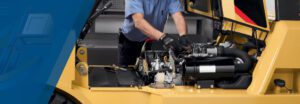
5 Ways to Effectively Manage Warehouse Space
1.Implement Vertical Storage Solutions Maximizing vertical space is one of the most effective ways to increase warehouse capacity without the need for costly expansions. By
Making an investment in new equipment nearly demands a positive ROI. When it comes to electric forklifts, the only way to do that is maximizing your productivity. Here we provide a number of tips to ensure that you’re getting the most out of your investment.
Using an electric forklift battery beyond 80 percent of its discharge can create electrical system problems. This practice also shortens battery life. The result can be that operators waste time performing more frequent battery changes/charges, and your facility’s overall productivity can suffer.
Forklifts last longer when they are used only for tasks they’re designed for, which means lifting loads. Pushing or shoving material on the floor or using a forklift to close railcar doors or tow trailers, for instance, generates heat within the transmission. This heat puts stress on vehicle components that the electric forklift was not designed to handle.
Remember, damage to a battery-powered forklift’s systems doesn’t require repeated abuse; it can occur almost immediately. For example, if an operator stalls the drive motor when pushing against a stubborn or immovable object, the heat created may go beyond critical levels in a few seconds. You may end up with an expensive repair job.
Some, newer electric lift trucks however, allow you to customize each forklift to your operation and operator. This programmable performance profiling in the control panel provides a means to balance production and with company policies, (e.g., maximum travel speed), in your facility. The ability to customize drive and hydraulic settings based on the application also allows you to adapt to individual operators’ preferences.
Battery-powered forklifts typically require less extensive planned maintenance attention than engine-powered forklifts. This means over their useful life, maintenance costs are usually less and you’ll find electric forklifts comparatively require less maintenance than their engine-powered counterparts. There are some tips to help you get better life from electric trucks, however.
If operators experience reduced run times, hot batteries and tray-to-ground shorts, poor watering procedures may be causing the problems.
You want to avoid under watering the battery; this causes heat and shorter life. Overwatering dilutes the acid in the electrolyte and reduces battery capacity.
Check water level following a charge cycle and then add water when the batteries are cool. You might want to set up a watering schedule based on your fleet’s needs. To do so, check the individual cell water heights weekly and note the number of days it takes for water levels to drop to the splashguards. Use this data to set up your watering schedule (weekly, biweekly or monthly). Once you’ve established a proper watering interval, you can add calendars to the front of batteries and mark off when they’ve been watered.
Make sure those who hook up chargers are trained in what type of chargers to use and where to connect them. Untrained employees could hook up the charger to the truck and not the battery; leaving you with an uncharged battery and possibly causing machine damage.
Every 6 months regular maintenance for electric forklift batteries should include an inspection of the cable and power connections. If you see signs of frayed wires, cuts or other damage, get those cables or connectors repaired immediately.
It’s a good idea to also check the chargers every six months or yearly. This way you can avoid possible safety hazards and poor recharging.
If you have questions about these electric forklift maintenance tips, or want help in setting up a battery watering and maintenance schedule, contact us for help.
Reduced emissions, reduced operating costs and the ability to run up to two shifts on one battery charge in many applications – the benefits of electric forklifts are clear.
Considering making the switch to electric lift trucks? Simply provide a few details to us on your current forklift fleet and application, and we’ll identify the most cost-efficient lift truck solution for your application. Contact us today to get started!

1.Implement Vertical Storage Solutions Maximizing vertical space is one of the most effective ways to increase warehouse capacity without the need for costly expansions. By

As a lift truck dealership with decades of material handling experience, we can relatively predict the future life span of many lift trucks. The clues
732.220.0444
1471 Jersey Avenue
North Brunswick, NJ 08902